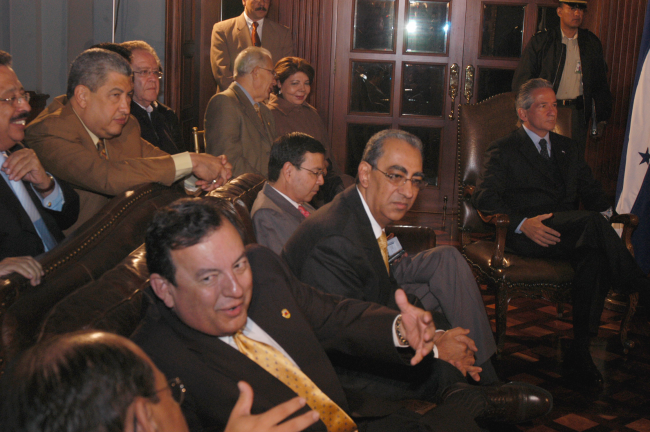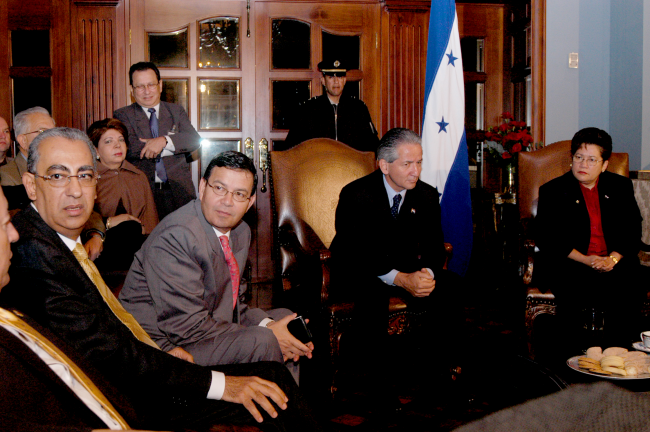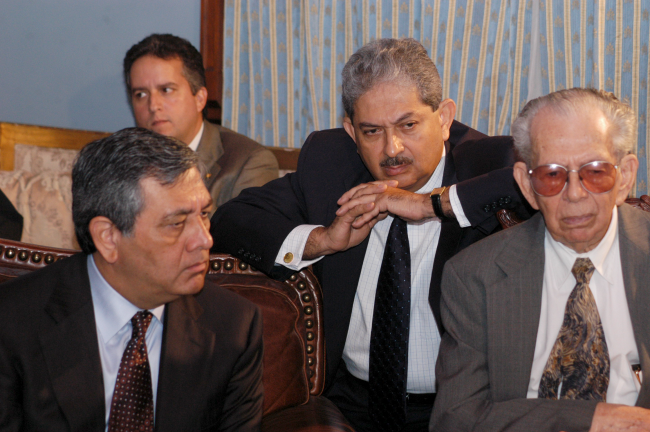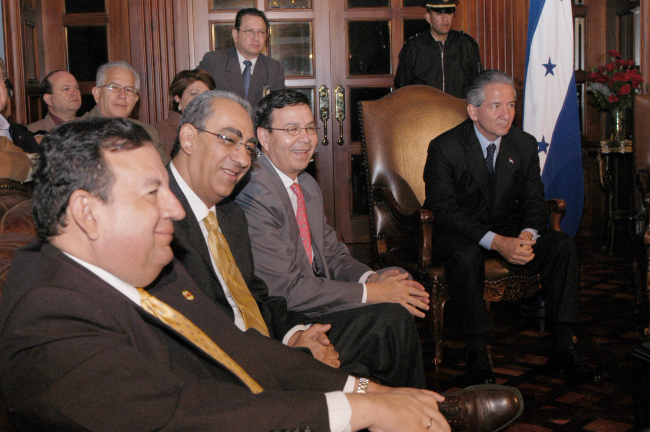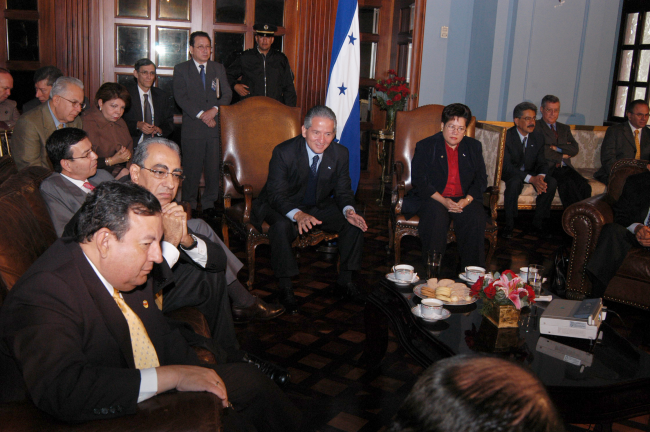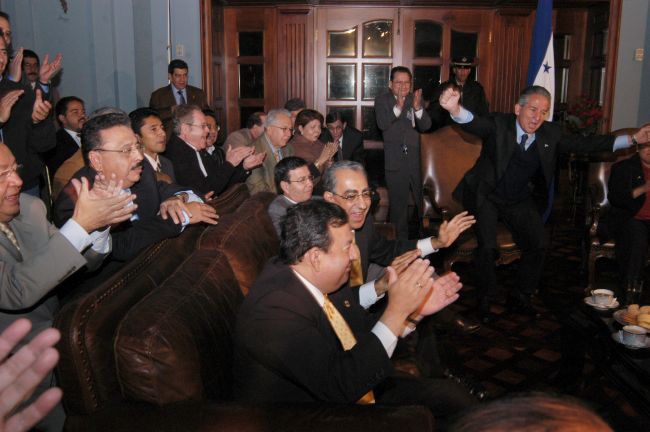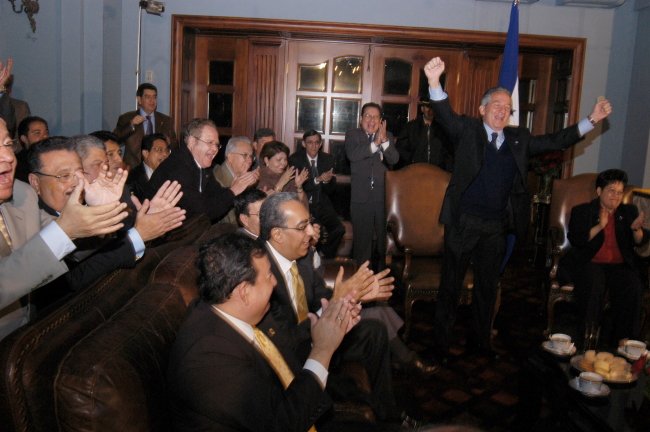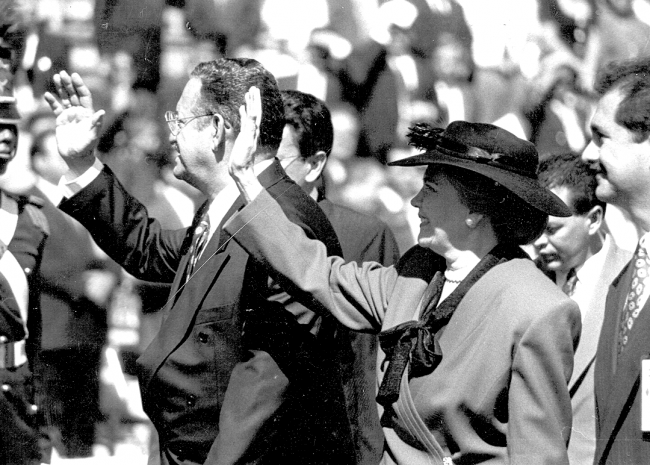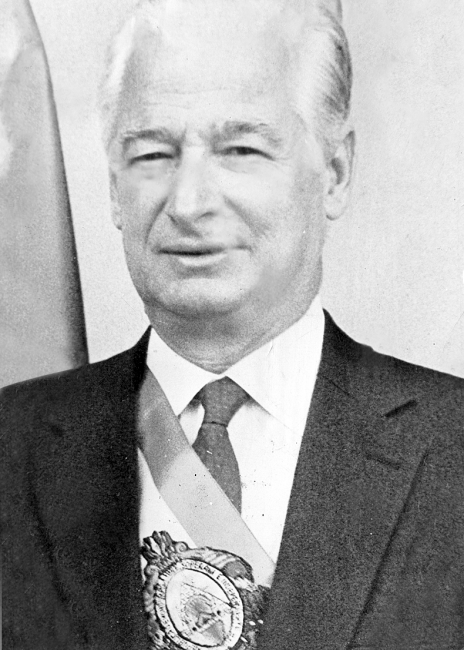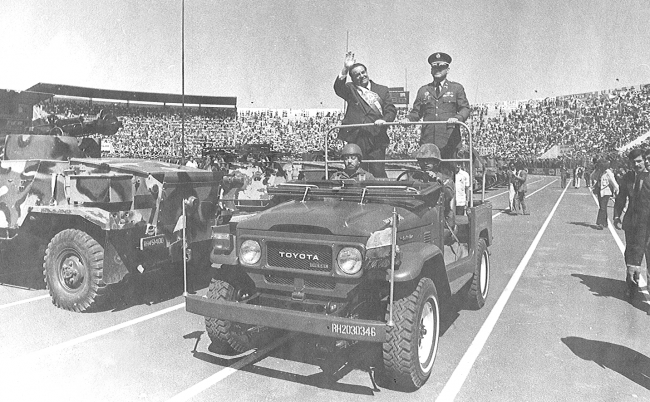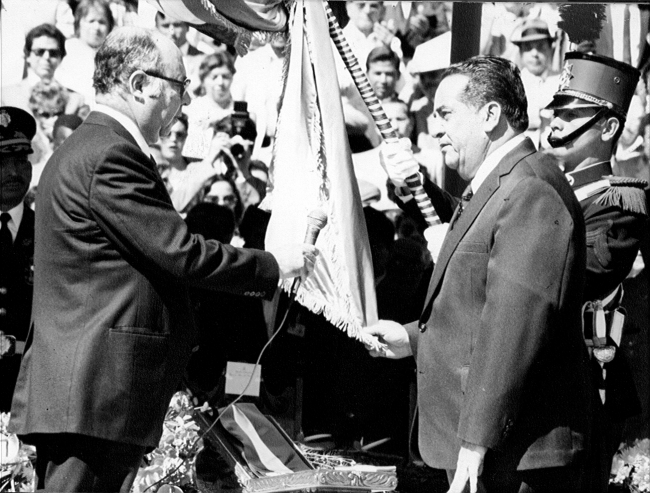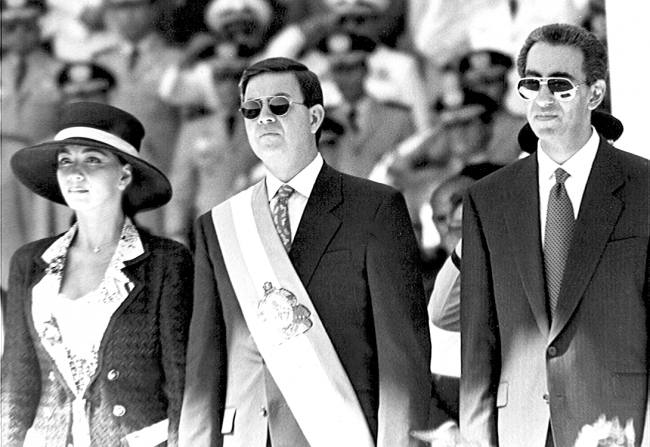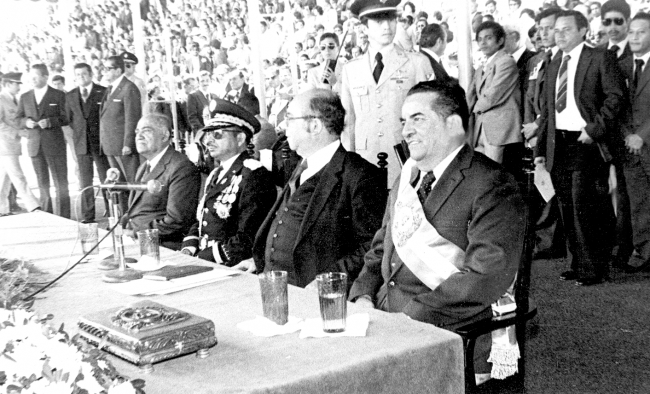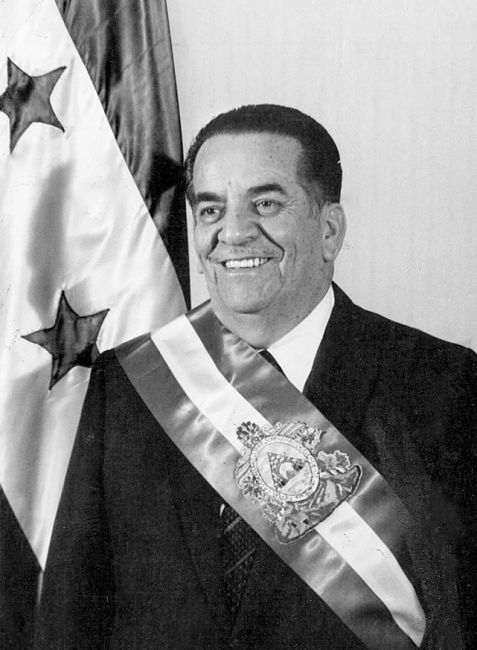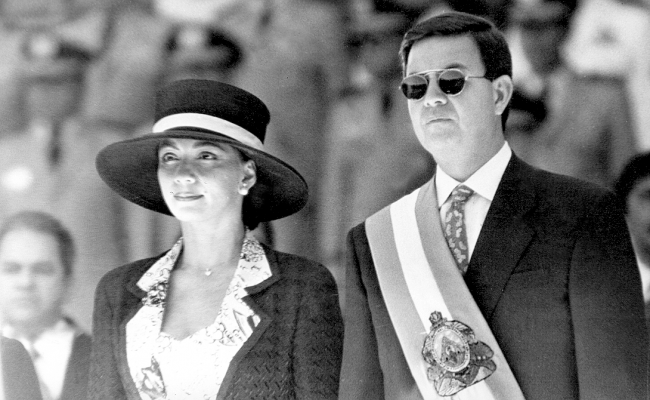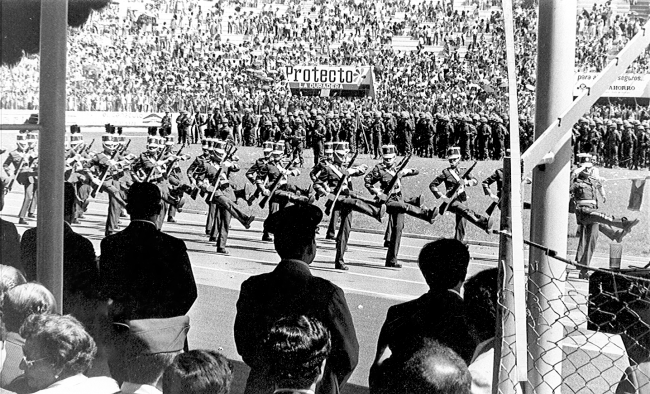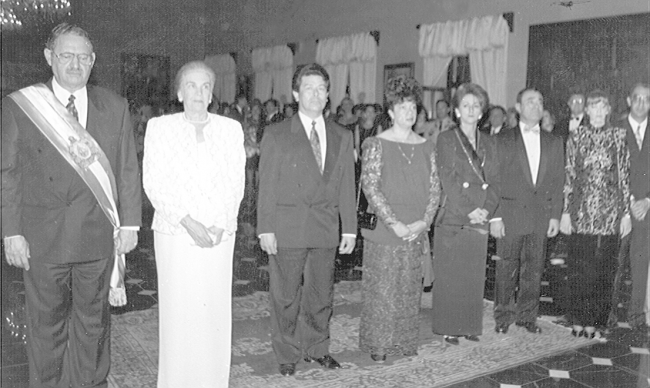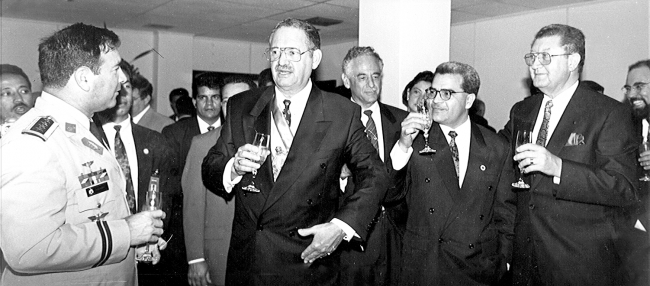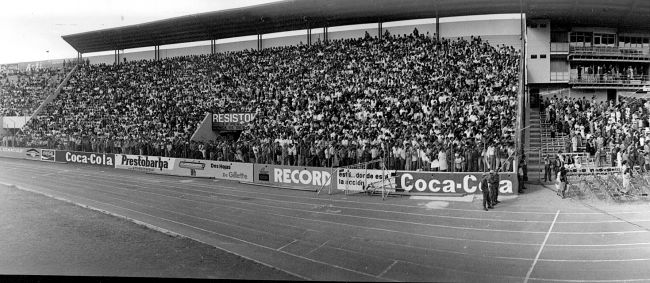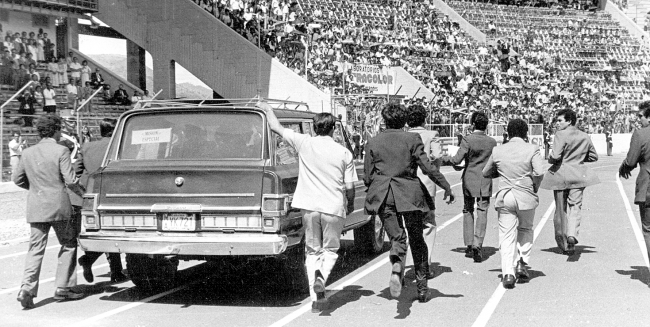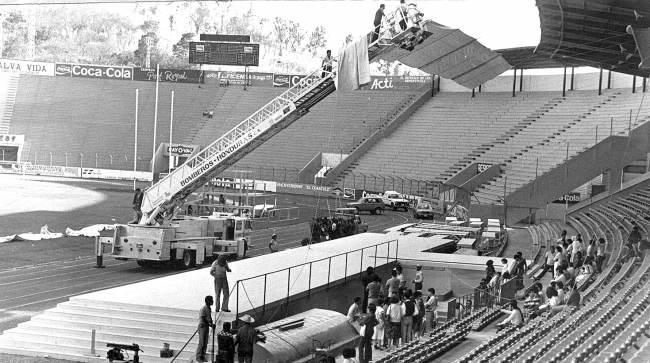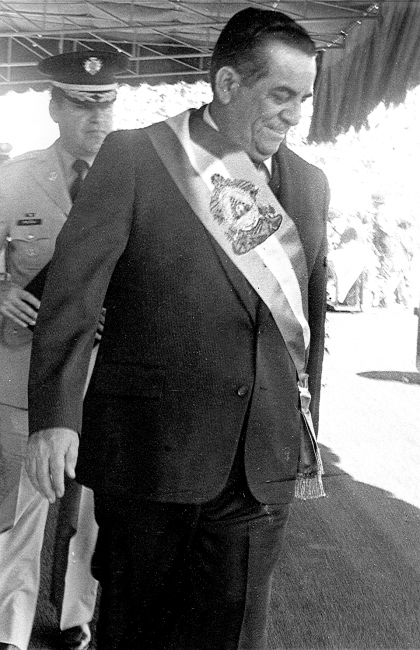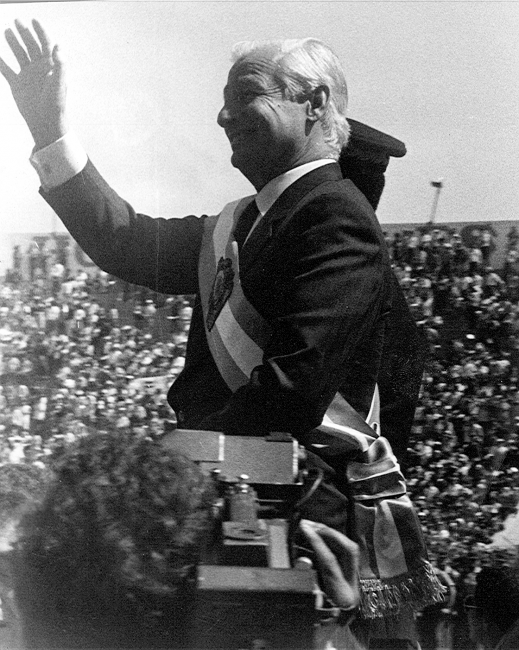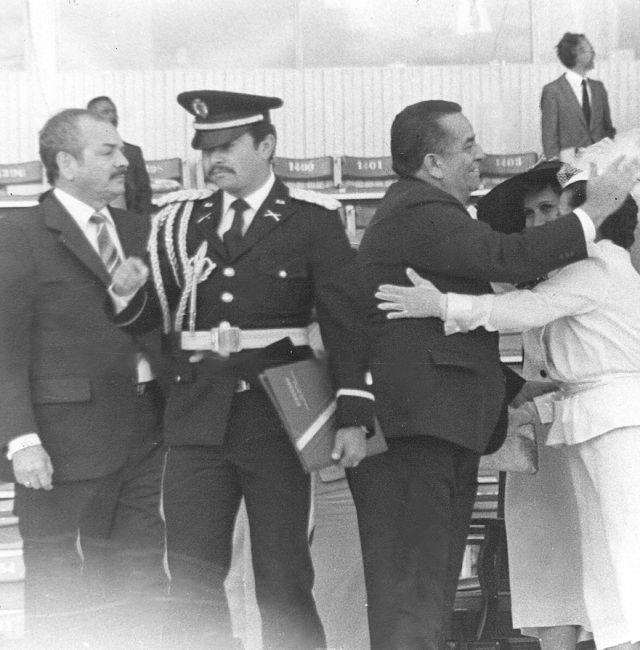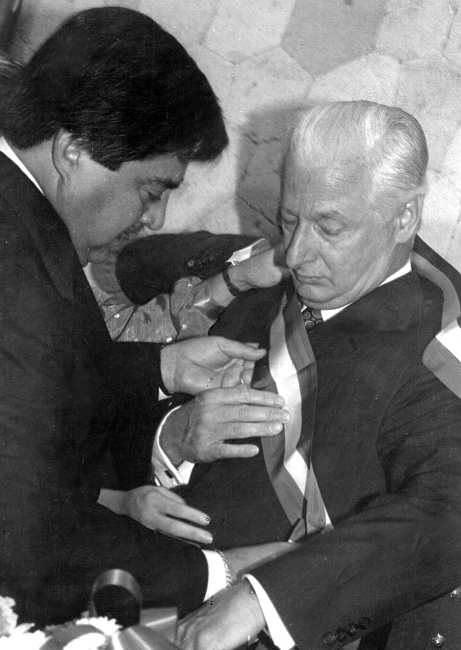Elections 1980 and 1981
After 16 years of military regimes, initiated with the overthrow of President Ramon Villeda Morales in 1963, and continued in 1972 after the forced departure of President Ramon Ernesto Cruz, the citizenry and the international community demanded a return to civilian, popularly elected governments.
In 1980, a Constituent Assembly was convened to issue a new Fundamental Law. The electoral result favored liberalism with 49.6% (495,779 votes), while nationalism obtained 42.4% (423, 263), the Innovation and Unity Party (Pinu) 3.5% (35, 263).
In exchange for allowing elections in 1981, the Armed Forces negotiated that the resulting government would not investigate criminal acts committed by high-ranking officials in the recent past.
Liberalism nominated Roberto Suazo Cordova, nationalism Ricardo Zuniga, PINU Enrique Aguilar Paz, Christian Democracy Hernan Corrales Padilla.
For the English political scientist Rachel Sieder, "the prospects for democratization were weakened by the geopolitical circumstances of the early 1980s together with the internal characteristics of both parties. The alliance between Suazo (Cordova), General (Gustavo) Alvarez Martinez and then-U.S. Ambassador John (Dimitri) Negroponte damaged the newborn constitutional order and facilitated a growing militarization.
Elections 1985
Roberto Suazo Cordova's continuing attempt to extend his presidential term beyond the four-year term, with the complicity of the National Elections Tribunal and Supreme Court justice, was neutralized by the president of National Congress, Efrain Bu Giron and General Walter Lopez Reyes - who replaced Gustavo Alvarez Martinez in the military leadership - provoked an institutional crisis and revealed the internal divisions in liberalism and the Army.
In liberalism, Simon Azcona Hoyo won, in nationalism Leonardo Callejas Romero. The addition of votes allowed the first one to come to power: with 49.2% of the total votes (786,603), despite the fact that, at an individual level, the second had received some 200,000 more votes than the first. Callejas counted 43.9% of votes (701,440), DC 1.9% (30,258), Pinu 1.4% (23,709). Nationalism won a majority in Congress. As in 1971, public posts were again divided between the two parties.
1989 Elections
The Callejas Administracion implemented the first "structural adjustment of the economy" proposed by the International Monetary Fund: monetary devaluation, privatization of state enterprises, inflationary rise, end of agrarian reform, anti-union offensive, promotion and diversification of exports, modernization of the State, were some of its features, as well as an increase in official corruption.
For the English political scientist Rachel Sieder, "the results of the 1989 elections were the evidence of a successful renewal that had been taking place in the National Party and the ability of the party to mobilize its bases".
Elections 1993
The official corruption, the impoverishment of the popular and middle classes resulting from the structural adjustment program with a dramatic increase in the cost of living, influenced the defeat of the National Party, which nominated Oswaldo Ramos Soto to the Presidency, while liberalism chose Carlos Roberto Reina, a representative of the "democratic left" opposed to the conservative, Rodista sector. His promise of a "moral revolution" was deeply rooted among the citizens.
Later, the defeated candidate denounced that the leaders of the national party had sabotaged his presidential campaign. His close ties with the Association for the Progress of Honduras (APROH), Gustavo Alvarez Martinez and Moon took away his votes. The National Party was defeated in all departments except Copan, Choluteca, Lempira, Valle and Intibuca.
The new administration in its economic policy continued with that of its predecessor by applying "structural adjustments" in the neoliberal line. Citizens' expectations of a return to a reformist program, similar to that of Ramon Villeda Morales, were diluted and the level of collective frustration deepened.
Among its achievements: the replacement of obligatory military service by the volunteer and the partial recovery of civilian control over the military, although the Armed Forces have increased their economic power with an impact on their political influence, visibly evident since 2009.
Elections 1997
Despite the resounding setback experienced in 1989 by the candidate Carlos Flores Facusse (analyzed in the work "Anatomy of a Defeat"), his persistence bore fruit and for the 1997 elections he was again nominated as the presidential candidate for liberalism. By then, the more traditional sector had displaced the "democratic left" of the executive positions, with the consequent partisan right-wing, a visible change from Suazo Cordova.
For the first time in Honduras, a lady was nominated as presidential candidate: Nora Gunera de Melgar, for nationalism.
Since the 1993 elections, the vote had been implemented on a separate ballots to elect the municipal majors and presidential positions, and in the 1997 general elections the vote was introduced on ballots. Since then, the voter receives three different ballots: candidate for president, deputies and members of the municipal corporations. Domiciliary voting was also used for the first time in this election.
In October 1998, Honduras was devastated by Hurricane Mitch, the deadliest hurricane in the history of natural disasters suffered in the country, with social, environmental, and economic consequences. From that date, the Flores Administration had to begin, with the valuable collaboration of the international community, the reconstruction of the nation. In spite of governmental reluctance, civil society had to be incorporated into this process to provide feedback to programs such as the National Reconstruction and Transformation Plan, the Poverty Reduction Strategy, and the forgiveness of the foreign debt when it was included among the highly indebted poor countries.
On the positive side, the Flores Administration consolidated, at least temporarily, civilian control over the military establishment, which provoked a coup of insurrection by a military faction, fortunately without achieving its destabilizing purpose.
Elections in 2001
Nationalism nominated businessman Ricardo Maduro as its presidential candidate, liberalism Rafael Pineda Ponce, head of the Legislative. Legal controversy provoked the nationality of the first, born in Panama of Honduran mother, Panamanian father, which excluded him from aspiring to the Executive's ownership of the current Constitution.
International pressure, the decision of a Brazilian arbitrator who ruled that he was Honduran by birth and a questioned constitutional interpretation made possible his legal recognition for his registration in the election run. The other major electoral issue was the increase in criminal violence, of which Maduro was a victim when his son was murdered.
"Zero Tolerance" was the main promise of his campaign, which made its way into the
citizenship. His government plan was published under the title My Commitment to You.
He received the backing of Callejas, while Flores did it half-heartedly with respect to Pineda Ponce.
In macroeconomic terms, the Maduro administration achieved a satisfactory performance: increase in international reserves, reduction of the fiscal deficit, attraction of foreign investment, including from El Salvador given its status as a minority partner in companies of that nationality, GDP growth with respect to population growth, negotiation of the Free Trade Agreement with the United States, which was not projected in the microeconomic: 110,000 poorer households than five years ago, decrease in the world human development index with respect to 2002, shortage of medicines in state hospitals, application of three structural adjustments while the private financial sector reported significant gains in 2005 higher than 1.3 billion Lempiras.
2005 Elections
After internal elections, liberalism nominated Manuel Zelaya Rosales as presidential candidate, and nationalism Porfirio Lobo. On November 27, the voters gave the first the victory, although the latter did not accept the preliminary result.
Lobo was harmed in the result by his campaign that emphasized the application of the death penalty and the "hard hand", evoking the "peace" implemented by Carias; he accused his contender of being allied with the maras (gangs). Zelaya benefited from his successful performance as the head of the FHIS that projected him at the national level. He emphasized "citizen power" and the fight against corruption, promising repression with the rehabilitation of criminals.
The new Congress materialized the Zelaya promise by issuing the Law of Citizen Participation, regulated fuel prices via price reduction, proposing to the transnational oil companies that they absorb 50% of the reduction and the government would subsidize the remaining 50%, which they rejected. Therefore, the government had to proceed with inter-national bidding.
The increase to the minimum wage by 62%, when the world was already suffering from a severe economic recession, provoked business rejection as well as the strengthening of political-diplomatic relations with Chavez's Venezuela, which also alarmed Washington, as well as the project to convert Palmerola air base into a commercial airport. The relations between the Executive and the Legislative and Judicial branches were strained, contributing decisively to the moment when Zelaya tried to present the electorate with a fourth ballot box proposing the installation of a Constituent after the 2009 elections, leading to his overthrow and ousting on June 28, 2009.
2009 Elections
This election was carried out against the backdrop of the June 28 coup d'etat that overthrew President Zelaya, "a fact that generated division and confrontation among the Honduran population, while plunging them into a situation of political, economic, social instability and defenselessness against the actions of force by the Police" (Fundacion de Organismos para el Desarrollo de Honduras). Report on the 2009 General Elections in Honduras.
Liberalism, after holding internal elections in which Elvin Santos won and the president of Congress, Roberto Micheletti, was defeated, and the fist was appointed as the candidate, and nationalism selected the former President of the Legislative, Porfirio Lobo.
For the first time an Afro-Honduran, Bemard Martinez, was nominated by Pinu as its candidate for the Executive Branch.
Lobo Sosa's presidential term was characterized by the rise in public corruption, which reached the highest levels under his administration, the most dramatic case was the systematic looting of the funds of the Honduran Social Security Institute, with the aggravating circumstance that Lobo later admitted having knowledge of it, but without informing the competent authorities or the people of what happened, in order not to harm his party in the following presidential elections.
Elections 2013
For these elections the number of political parties participating in the electoral process was increased, with varied proposals ranging from right to left, with populist elements in both, allowing voters a greater number of options and candidates: As a Venezuelan political scientist predicted, "after the next elections in 2013, Honduras will release a political map that will reflect the new configuration of its party forces, with an ideological articulation that is clearer than that existing today.
For the second time, a lady was nominated for the presidential candidacy: Xio-Mara Castro de Zelaya (wife of former President Manuel Zelaya Rosales) for Libre; Nationalism selected the Legislative President, Juan Orlando Hernandez, Pac chose Salvador Nasralla; Patriotic Alliance Romeo Vasquez Velasquez (retired military), FAPER Andres Pavon), Liberalism elected Mauricio Villeda Bermudez (son of former ruler Ramon Villeda Morales).
Since Nationalism did not obtain a parliamentary majority, it had to incorporate Liberalism as an ally. The bipartisan monopoly had come to an end, corroborated by the results of the 2017 election.
